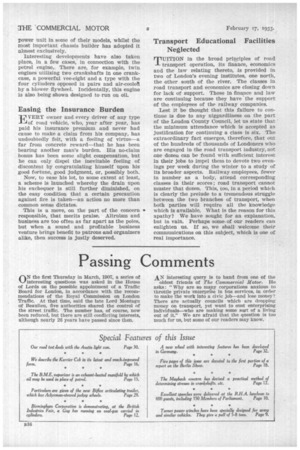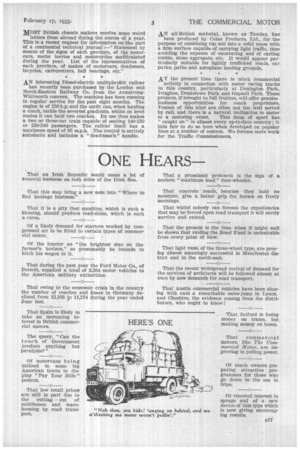Passing Comments
Page 30

Page 31

If you've noticed an error in this article please click here to report it so we can fix it.
ON the first Thursday in March, 1907, a series of interesting questions was asked in the House of Lords on the possible appointment of a Traffic Board for London, in accordance with the recommendations of the Royal Commission on London Traffic. At that time, said the late Lord Montagu of Beaulieu, five authorities shared the control of the street traffic. The number has, of course, now been reduced, but there are still conflicting interests, although nearly 26 years have passed since then. AN interesting query is to hand from one of the oldest friends of The Commercial Motor. He asks: "Why are so many corporations anxious to throttle private enterprise in bus services, in order to make the work into a civic job—and lose money'? There are actually councils which are dropping money on transport, yet want to oust enterprising individuals—who are making some sort of a living out of it." We are afraid that the question is too much for us, but some of our readers may know.
MOST British chassis makers receive some weird letters from abroad during the course of a year. This is a recent request for information on the part of a continental technical journal :—" Statement by means of the signs of each province, of the motorcars, motor lorries and motorcycles matriculated during the year. List of the representatives of each province, of makes of motorcars, deadeners, bicycles, carburetters, ball bearings, etc."
AN interesting Diesel-electric multiple-al:tit railcar
has recently been purchased by the London and North-Eastern Railway Co. from the ArmstrongWhitworth concern. The machine has been running in regular service for the past eight months. The engine is of 250 h.p. and the outfit can, when hauling a coach, tackle the severest gradients, whilst on level routes it can haul two coaches. Its use thus makes a two or three-car train capable of seating 140-150 or 220-240 passengers. The railcar itself has a maximum speed of 65 m.p.h. The control is entirely autoilatic and includes a "dead-man's" handle.
AN all-British material, known as Terolas, has been produced by Colas Products, Ltd., for the purpose of combining top soil into a solid mass with a firm surface capable of carrying light traffic, thus avoiding the expense of excavating and of carting rubble, stone aggregate, etc. It would appear particularly suitable for lightly trafficked roads, car parks, paths and aeroplane landing grounds.
AT the present time there is much commercial activity in connection with motor racing tracks in this country, particularly at Donington Park, Ivinghoe, Drakelowe Park and Gopsall Park. These projects, if brought to full fruition, will offer genuine business opportunities for coach proprietors. Venues of this kind are often not too well served by rail, and there is a natural inclination to motor to a motoring event. This form of sport has "caught on" in almost every up-to-date country ; it bids fair to do so here when developed on popular lines at a number of centres. We foresee more work for the Traffic Commissioners.




























































































